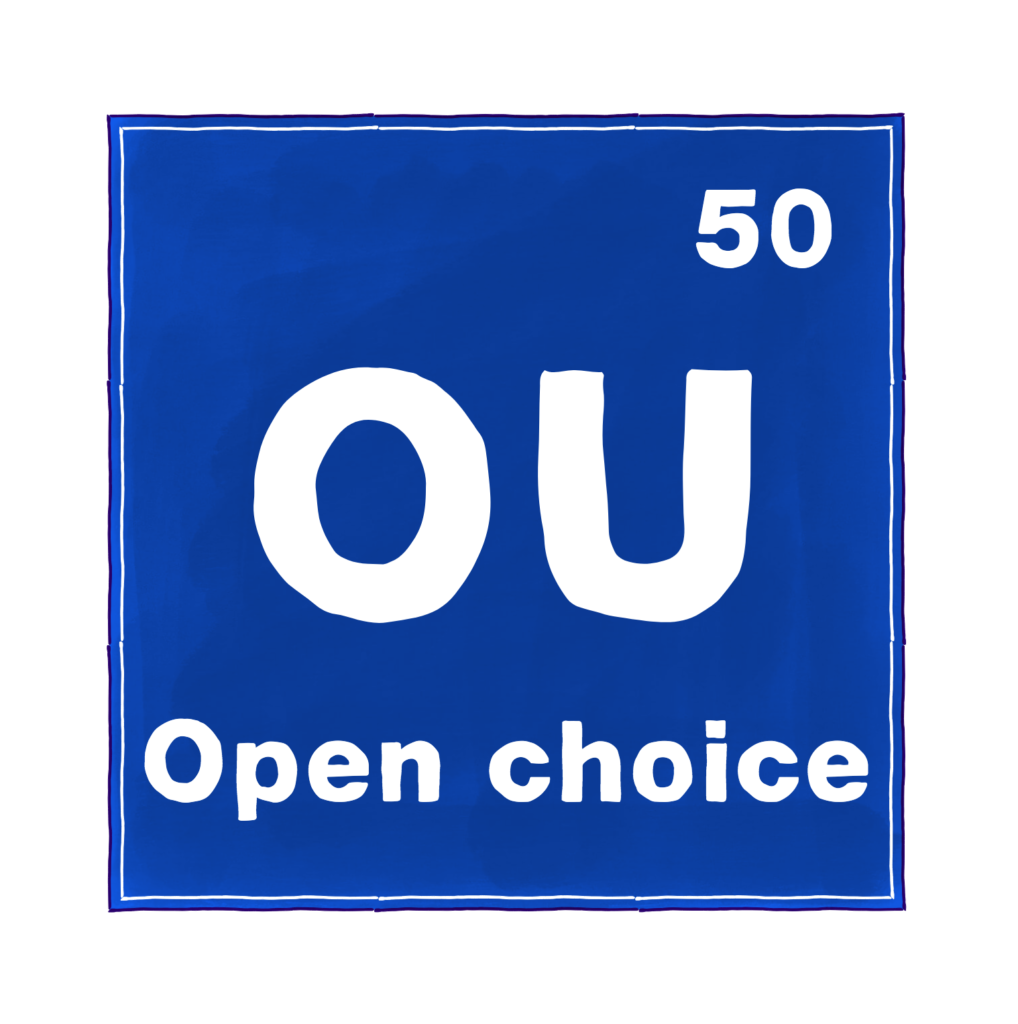Open as in choice

(Made with Bryan’s lovely remixer)
I’ve recently taken on a new role at the Open University, as the Chair of the Open Board of Studies. This means I’ve got responsibility for our Open Degree. When the OU was founded you could only get a BA(Open) – there were no named degrees. This was an explicit attempt by the OU’s founders to make an OU degree different not just in mode of study but in substance. Students constructed their own degree profiles, meaning our modules were truly modular, you could pick and mix as you saw fit. My colleagues Helen Cooke, Andy Lane and Peter Taylor give an excellent overview of the history, philosophy and approach of the open degree in this paper. The OU’s first VC put it like this:
Sure, most universities offer options and electives, but a truly flexible, open choice is very rare. Specialism is of course, a desirable mode of study in many areas. But the reasoning behind the original open choice was that the changes in society and work places in the 70s meant that a wide ranging degree was suitable for many vocations. If that was true at the founding of the OU, then it is doubly so now. While we should be sceptical of the “preparing students for jobs that don’t exist yet” claims, it’s fair to say that flexibility and breadth of understanding will be useful attributes in an evolving, digital economy. Let’s take my own area (field/discipline/rag tag bundle of vaguely connected ideas) of educational technology. You can create a degree programme that covers much of what you want, but actually it’s a varied domain, and half of the work involves having an understanding or appreciation of the demands of different subject areas. So a degree that has rich, and unpredictable, variety in it might well be exactly what you want for an educational technologist. And that is increasingly true for roles that evolve around tech, but are not necessarily TECH.
It is often claimed that in order to solve the complex, ‘wicked’ problems that the world faces, such as sustainability, climate change, social inclusion, then interdisciplinary thinking is required. But our degree profiles continue to prioritise narrow specialisms instead of encouraging students to develop knowledge and skills across a range of topics. This gives them empathy with other viewpoints and a broader toolkit of conceptual models.
Perhaps more significantly than the employment argument though is that constructing your own degree profile and taking responsibility for your pathway gives agency to learners. George Veletsianos asks “in education, what can be made more flexible?”, to which I would respond the whole degree structure.
Coming to this from a broader open education perspective, I see the work of OER, open textbooks, open access and MOOCs as laying the necessary groundwork for a wave of more interesting exploration around what open approaches offer. Open pedagogy and Open educational practice are examples of this. I would argue that although it is already 50 years old, the truly open choice of the OU is another one and it’s time has come round again.
![a student is the best judge of what [s]he wishes to learn and that [s]he should be given the maximum freedom of choice consistent with a coherent overall pattern. They hold that this is doubly true when one is dealing with adults who, after years of experience of life, ought to be in a better position to judge what precise studies they wish to undertake](https://blog.edtechie.net/wp-content/uploads/2019/05/D7kBenbX4AE-lrD-1024x576.jpg)

6 Comments
Gavin Moodie
Congratulations. I look forward to further developments.
There are many practical limits to openness, with varying justifications. But I wonder what the philosophical limits to openness may be, or the limits to openness in principle? For example, some believe that openness includes being open to accrediting knowledge and skills gained outside the academy. But what counts as knowledge and skills for the purposes of recognising prior experiential learning?
Cath Brown
Really like the point about giving agency to learners, Martin. I think that is crucial in many ways, and has far reaching implications.
At the moment we are probably more multidisciplinary rather than interdisciplinary, but I think that gets us a fair way there, myself.
Pingback:
Dave Cormier
I would love to hear your thoughts on the balance between openness in a degree structure and the kind of scaffolding that a first-in-family student needs to understand what they are doing. The quote from Perry is a good foundation, maybe, but practical attempts at open learning have suggested to me that without scaffolding, people who are new to the process don’t have enough context to make those decisions. The need to take the degree before they can appreciate the options to customize…
mweller
It is a very good point Dave. We do put a lot of effort into helping them make that choice, including phone advice, recommended pathways, links to OpenLearn content as tasters, diagnostic tools, etc. So we get them to start with a foundation course which builds study skills and so from there they have some scaffolding. It is the problem with all approaches that emphasise student agency, it’s why connectivism is not a good approach for level 1 students for instance, the learner doesn’t know what it is they need to know (a form of meno’s paradox). But I think our courses are long enough and we have the right scaffolding in place to at least help make that choice (our students are mature also so often have quite clear ideas about what they want to do).
Pingback: